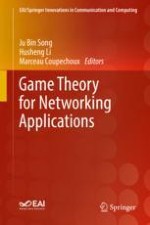2019 | OriginalPaper | Buchkapitel
11. Social Coordination and Network Formation with Heterogeneous Constraints
verfasst von : Qingchao Zeng
Erschienen in: Game Theory for Networking Applications
Aktivieren Sie unsere intelligente Suche, um passende Fachinhalte oder Patente zu finden.
Wählen Sie Textabschnitte aus um mit Künstlicher Intelligenz passenden Patente zu finden. powered by
Markieren Sie Textabschnitte, um KI-gestützt weitere passende Inhalte zu finden. powered by
